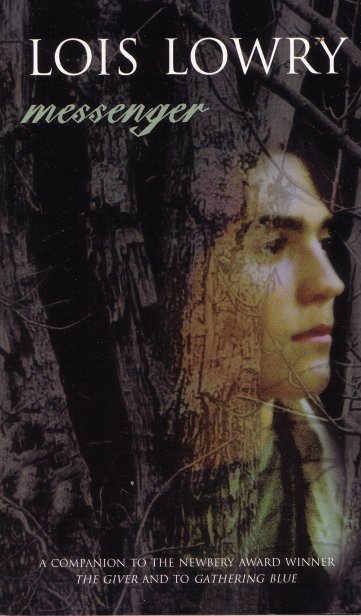
Messenger

This is another book in the series of books that deal with a Village that accepts people who have various disabilities, etc. The level of technology in the village is not much beyond that of around the 17th century in the US.
There are other towns around, but the conditions in them seem to be generally rather bad.
Anyhow, the main character in the book is Matty, who came to the Village as a young boy and adapted well. He is a messenger, carrying messages from the Leader of the Village through the Forest.
Forest seems to be almost a sentient place, and in the time just prior to the story it has seemed to taken on an evil personality. Even some of the people in the Village begin to act in a dark, almost evil fashion, and the decision is made to close the Village to outsiders. Matty must carry the message to other places, post it in the forest, and bring the daughter of Seer, the blind man he lives with, back from her town to the Village through a Forest that is rapidly becoming more and more openly hostile.
The story itself is good, as far as it goes. The ending is sort of like a Japanese traditional “and this is what happens to the hero” ending. The problem with the book lies in what it doesn't bother to bring up.
The Forest is turning evil. Some of the people are turning evil. Yet there is no one questioning just what it is that is causing this. Is the Forest turning evil because someone is causing it to be that way? Or is it changing on its own? What relationship is there between what is going on in the Forest and what is going on in the people?
The reason I bring it up is this. The Forest is healed at the end of the book. Fine. But, since no one knows what caused the Forest to turn evil in the first place, then there is no guarantee that the healing is permanent or even long term. The Forest could be good again forever. It might change again in a decade, or perhaps a year, or even in a matter of weeks.
Without having any idea what it is they are working against, simply healing the Forest does not necessarily solve their problems, but no one seems to be very concerned about this. It bothers me when such a rather obvious question of “what's the actual cause of this mess” isn't even brought up. To me, recognizing the cause of the Forest turning evil, and doing something about the cause (if possible) should be the issue satisfied by the end of the book.
Thus, I would say this is a decent read, but it is the kind of book that doesn't stand up to being looked at too closely.
Back to Josefina index page
Back to main home page index
|